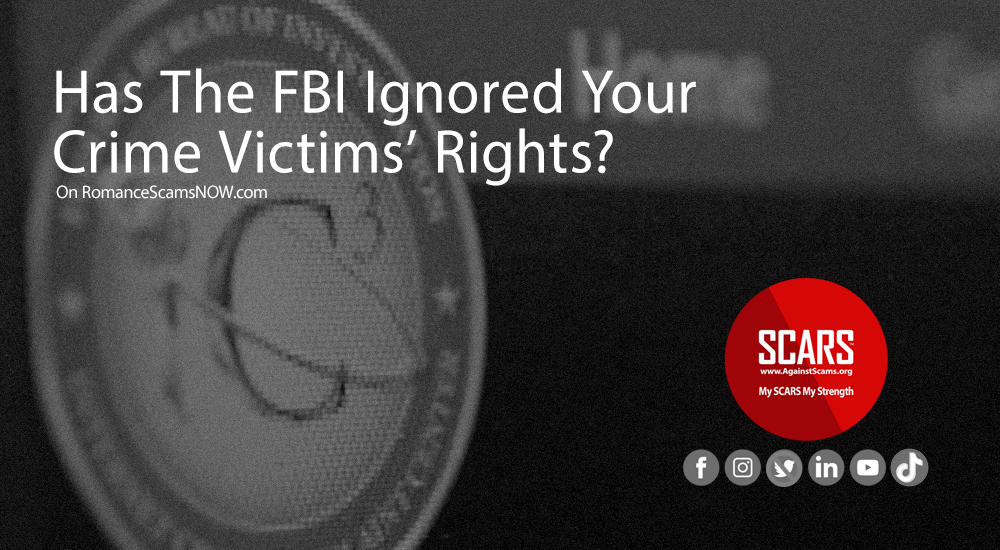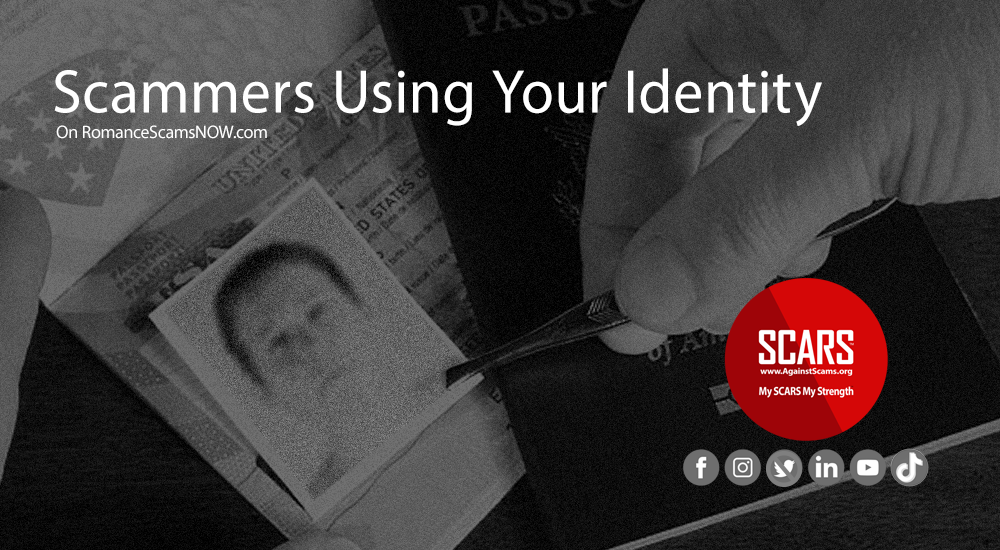
SCARS Institute’s Encyclopedia of Scams™ Published Continuously for 25 Years

Scammers Using Your Identity
You Gave Them All They Need!
A SCARS Insight
Scam Victims Send Money To Scammers!
But Sometimes Scammers Keep The Money In The Victim’s Name!
There is a practice that has been going on for at least a decade in several African countries, and in Asia and the Middle East too!
The Scenario
A scam victim wants to send a sizable amount of money to a scammer. The only practical way to do this is via bank wire transfer (through the SWIFT system).
So the scammer, anticipating the receipt of the money works with one of their local corrupt bankers to open an account in the victim’s name. This is not hard since the scammers usually have local bankers in their pockets, and the victims usually supply enough information to enable this – such as passport information.
The corrupt banker opens the account in the victim’s name. This helps the scammer hide from their local governments and avoid seizures or taxes in their income. After all the money is in the name of the victim – though because the account was set up by the scammer and the corrupt banker, the scammer has full access to the money.
Once set up, the victim sends their money that goes into this account – secretly in their name. But the scammer can also use this account to receive even more money from many other victims. In fact, this type of account can be used to receive money from thousands of victims. When the money hits the account it can be forwarded to another “safe” account somewhere else, such as in Malaysia, Indonesia, Vietnam, etc. From the perspective of these transactions, it appears that it is all done by the victim whose name is on the first account.
Eventually, governments find these accounts and identify the original victim as an accessory in the money laundering chain. Of course, sometimes the banker is also identified and arrested. But for the original victim, they are now international money launderers and subject to arrest and in rare cases extradition to the country in question – if there are agreements between the victim’s home country and where the scammer set up the account. Even without that, the victim’s name goes on international money laundering watch lists around the world.
The Victim Is Double Victimized
What few victims pay any attention to is how scammers may be using their identities.
For example, scammers often have enough information to request a replacement passport from the victim’s country’s embassy. Or obtain credit cards internationally. Or sign the victim up to be responsible for international loans.
Victim’s names can be used on illicit shipments of products, from knock-off fake goods, to weapons, to drugs. These shipments can go to third-party countries or to the victim’s own country.
Scammers are part of global organized crime networks and identities have high value for the things that can be done with them to hide the identity of the real criminals. Victims would be completely unaware of these activities until someone shows up at their down to arrest them, or they travel to an affected country and are arrested at the point of entry.
When Victims Do Not Report Their Scam
The problem is that when victims do not report their scam, in effect, they have no proof that the scam occurred. At least proof that would be legally acceptable in all cases.
The importance of reporting the crime, starting with the local police and then with the national police (FBI, NBI, RCMP, ActionFraud, Europol, etc.) is that it establishes that a crime did happen and that the victim is the victim of that crime. This is kind of like reporting that your car is stolen, and then finding out it was used in a bank robbery – because you reported it, it becomes clear you are not involved. This is a “get out of jail free card.” It establishes that whatever happens afterward or by the scammer, you are not held responsible or at least have proof that you are the victim of a crime.
Most Victims Provide Enough Information
It really does not matter the type of the scam. They can be romance, lotto, government impersonation phone scams, tech support scams, or others.
Sadly, most victims provide more than enough information for scammers to use their identities and a multitude of ways for their criminal purposes.
- Normal identity theft: bank accounts, credit cards, loans, and more
- Money laundering: money transfers, conversion to bitcoin, cashier’s checks, certificates, stocks, bonds, and more
- Customs transactions: movement of goods across borders – illicit or legitimate items
- Commodity purchases: petroleum products, agricultural goods, etc.
- Fake vehicle registrations: cars, boats, planes, more
- Real replacement documents: vehicle titles, home titles, ID cards, passports, etc.
- Tax return fraud: obtaining the victim’s tax refunds
- Unemployment & benefits fraud: filing for unemployment claims or other government benefits using the victim’s name
- Insurance beneficiary: scammers also change the beneficiaries on life and other types of insurance
These are but a few of the ways scammers can use the victim’s name and identity, both internationally and in the victim’s own country. If there is a way, the scammers will find a way to do it. If not the scammer that the victim had contact with, then by other criminals that the scammer sold the information to.
After The Scam Check Everything
After you have been scammed you need to go systematically through all of your possible weak points.
Start with the information you know you gave to the scammer: passports, driver’s licenses, social security, etc. With your police report number in hand, contact the agencies and request new identification documents and numbers. In most countries, with proof of reporting an identity theft, you can obtain new documents at little or no cost.
Don’t forget to contact all of your financial institutions and change your accounts. Be sure to alert banks, credit cards, and credit bureaus.
Most victims completely overlook these processes and as a result, end up having their identities stolen.
In the U.S. fully 50% of the residents are at risk right now. Similar numbers for the U.K. and Europe. This is why reporting to the police is a requirement not an option!
If you never sent money, or never gave the scammer any information you still need to be alert to the possibility of these events. Scammers can harvest vast amounts of information from social media profiles. In many cases, they can find enough information that victims publish about themselves to be able to steal or use their identity.
Ask Yourself
You may not want to report to the police. You may feel ashamed, embarrassed, guilty. You may not want anyone to find out. But a small amount of discomfort and effort now can help you avoid massive problems and legal responsibility later on.
So what are you going to do?
You can remain in denial or angry and avoid doing what you need to do or you can report the crime.
Even if you did not lose money you should still report it. Many communities, states or provinces, and national police allow for online reporting. Always report locally first and get a report or record number that you can keep in your crime record organizer (such as the SCARS RED BOOK available here).
You have the choice to set the stage for your own protection in the future, or you can avoid the whole issue and roll the dice to see what happens.
Just remember, scammers are professionals and they will not leave money on the table. If they can exploit your identity, they will. Period!
-/ 30 /-
What do you think about this?
Please share your thoughts in a comment below!
LEAVE A COMMENT?
Thank you for your comment. You may receive an email to follow up. We never share your data with marketers.
Recent Comments
On Other Articles
- on Love Bombing And How Romance Scam Victims Are Forced To Feel: “I was love bombed to the point that I would do just about anything for the scammer(s). I was told…” Feb 11, 14:24
- on Dani Daniels (Kira Lee Orsag): Another Scammer’s Favorite: “You provide a valuable service! I wish more people knew about it!” Feb 10, 15:05
- on Danielle Delaunay/Danielle Genevieve – Stolen Identity/Stolen Photos – Impersonation Victim UPDATED 2024: “We highly recommend that you simply turn away form the scam and scammers, and focus on the development of a…” Feb 4, 19:47
- on The Art Of Deception: The Fundamental Principals Of Successful Deceptions – 2024: “I experienced many of the deceptive tactics that romance scammers use. I was told various stories of hardship and why…” Feb 4, 15:27
- on Danielle Delaunay/Danielle Genevieve – Stolen Identity/Stolen Photos – Impersonation Victim UPDATED 2024: “Yes, I’m in that exact situation also. “Danielle” has seriously scammed me for 3 years now. “She” (he) doesn’t know…” Feb 4, 14:58
- on An Essay on Justice and Money Recovery – 2026: “you are so right I accidentally clicked on online justice I signed an agreement for 12k upfront but cd only…” Feb 3, 08:16
- on The SCARS Institute Top 50 Celebrity Impersonation Scams – 2025: “Quora has had visits from scammers pretending to be Keanu Reeves and Paul McCartney in 2025 and 2026.” Jan 27, 17:45
- on Scam Victims Should Limit Their Exposure To Scam News & Scammer Photos: “I used to look at scammers photos all the time; however, I don’t feel the need to do it anymore.…” Jan 26, 23:19
- on After A Scam, No One Can Tell You How You Will React: “This article was very informative, my scams happened 5 years ago; however, l do remember several of those emotions and/or…” Jan 23, 17:17
- on Situational Awareness and How Trauma Makes Scam Victims Less Safe – 2024: “I need to be more observant and I am practicing situational awareness. I’m saving this article to remind me of…” Jan 21, 22:55
ARTICLE META
Important Information for New Scam Victims
- Please visit www.ScamVictimsSupport.org – a SCARS Website for New Scam Victims & Sextortion Victims
- Enroll in FREE SCARS Scam Survivor’s School now at www.SCARSeducation.org
- Please visit www.ScamPsychology.org – to more fully understand the psychological concepts involved in scams and scam victim recovery
If you are looking for local trauma counselors please visit counseling.AgainstScams.org or join SCARS for our counseling/therapy benefit: membership.AgainstScams.org
If you need to speak with someone now, you can dial 988 or find phone numbers for crisis hotlines all around the world here: www.opencounseling.com/suicide-hotlines
A Note About Labeling!
We often use the term ‘scam victim’ in our articles, but this is a convenience to help those searching for information in search engines like Google. It is just a convenience and has no deeper meaning. If you have come through such an experience, YOU are a Survivor! It was not your fault. You are not alone! Axios!
A Question of Trust
At the SCARS Institute, we invite you to do your own research on the topics we speak about and publish, Our team investigates the subject being discussed, especially when it comes to understanding the scam victims-survivors experience. You can do Google searches but in many cases, you will have to wade through scientific papers and studies. However, remember that biases and perspectives matter and influence the outcome. Regardless, we encourage you to explore these topics as thoroughly as you can for your own awareness.
Statement About Victim Blaming
SCARS Institute articles examine different aspects of the scam victim experience, as well as those who may have been secondary victims. This work focuses on understanding victimization through the science of victimology, including common psychological and behavioral responses. The purpose is to help victims and survivors understand why these crimes occurred, reduce shame and self-blame, strengthen recovery programs and victim opportunities, and lower the risk of future victimization.
At times, these discussions may sound uncomfortable, overwhelming, or may be mistaken for blame. They are not. Scam victims are never blamed. Our goal is to explain the mechanisms of deception and the human responses that scammers exploit, and the processes that occur after the scam ends, so victims can better understand what happened to them and why it felt convincing at the time, and what the path looks like going forward.
Articles that address the psychology, neurology, physiology, and other characteristics of scams and the victim experience recognize that all people share cognitive and emotional traits that can be manipulated under the right conditions. These characteristics are not flaws. They are normal human functions that criminals deliberately exploit. Victims typically have little awareness of these mechanisms while a scam is unfolding and a very limited ability to control them. Awareness often comes only after the harm has occurred.
By explaining these processes, these articles help victims make sense of their experiences, understand common post-scam reactions, and identify ways to protect themselves moving forward. This knowledge supports recovery by replacing confusion and self-blame with clarity, context, and self-compassion.
Additional educational material on these topics is available at ScamPsychology.org – ScamsNOW.com and other SCARS Institute websites.
Psychology Disclaimer:
All articles about psychology and the human brain on this website are for information & education only
The information provided in this article is intended for educational and self-help purposes only and should not be construed as a substitute for professional therapy or counseling.
While any self-help techniques outlined herein may be beneficial for scam victims seeking to recover from their experience and move towards recovery, it is important to consult with a qualified mental health professional before initiating any course of action. Each individual’s experience and needs are unique, and what works for one person may not be suitable for another.
Additionally, any approach may not be appropriate for individuals with certain pre-existing mental health conditions or trauma histories. It is advisable to seek guidance from a licensed therapist or counselor who can provide personalized support, guidance, and treatment tailored to your specific needs.
If you are experiencing significant distress or emotional difficulties related to a scam or other traumatic event, please consult your doctor or mental health provider for appropriate care and support.
Also read our SCARS Institute Statement about Professional Care for Scam Victims – click here to go to our ScamsNOW.com website.
















This is very good information. I had no idea that the criminals could do these types of things with my identity. There is one piece of information supplied for protecting my identity that did not work. I contacted social security and they refused to give me a new number even though I had my case number from my police report. Instead they gave me information to set up multi factor authentication when accessing my account. I tried also to get a new driver’s license. Again I met with push back. The department of motor vehicles told me they do not issue a new driver’s license for any reason.
One of the few things that brought me a little satisfaction was reporting my scam to law enforcement agencies.